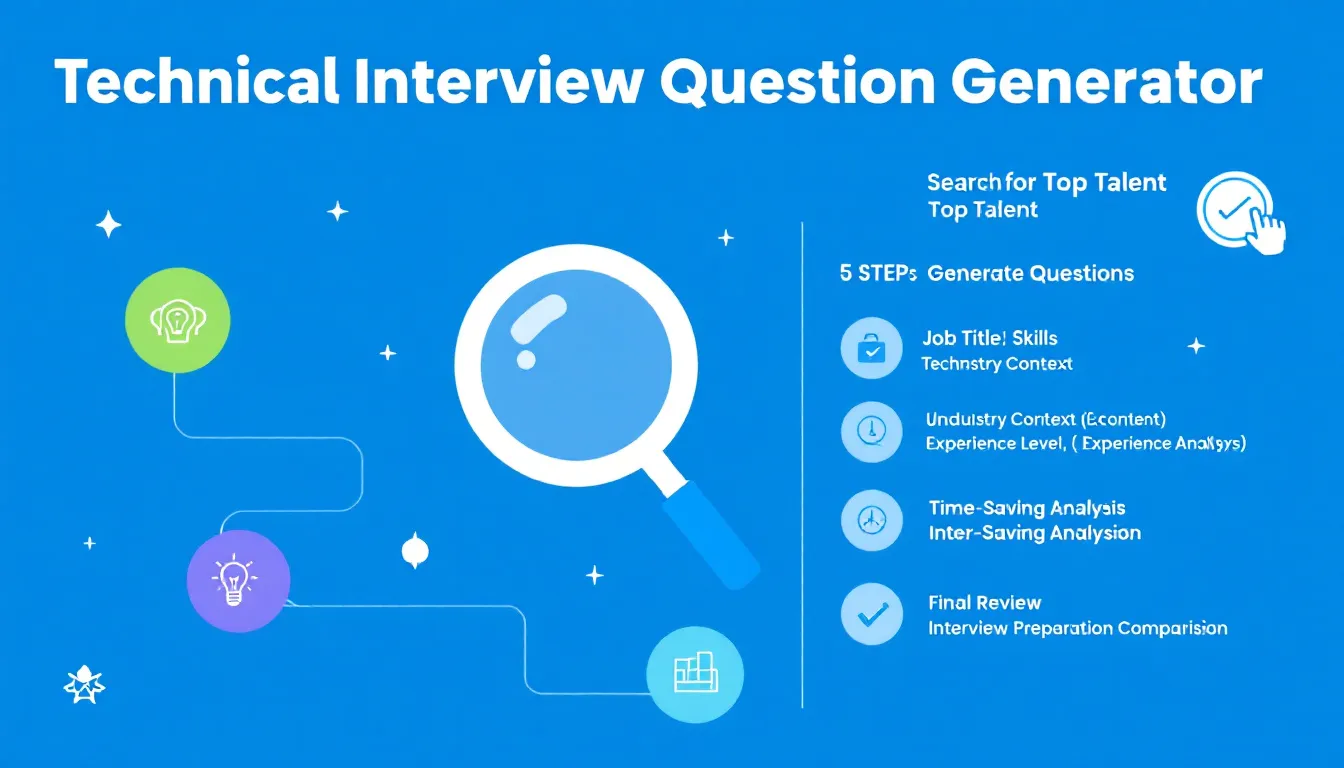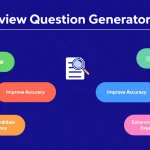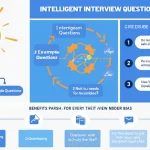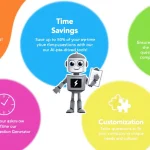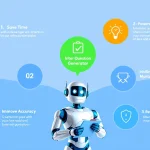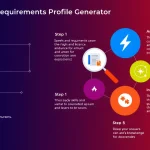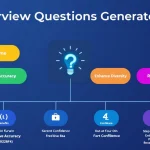Is this tool helpful?
How to Use the Interview Question Generator Tool Effectively
The Interview Question Generator Tool is designed to assist HR professionals and hiring managers in creating comprehensive technical interview questions tailored to specific job roles. Here’s a step-by-step guide on how to use this tool effectively:
1. Enter the Job Title
In the “Job Title” field, input the specific position for which you’re creating interview questions. This is a required field and forms the foundation of the generated questions. Examples:
- Full Stack Developer
- Cloud Solutions Architect
2. Specify Technical Skills (Optional)
Use the “Technical Skills” textarea to list key technical competencies required for the role. While optional, providing this information helps in generating more targeted questions. Examples:
- React, Node.js, MongoDB, AWS
- Azure, Kubernetes, DevOps, CI/CD
3. Provide Industry Context (Optional)
The “Industry Context” field allows you to specify the sector or domain of the job. This helps in tailoring questions to industry-specific scenarios. Examples:
- FinTech
- E-learning
4. Indicate Experience Level (Optional)
Use the “Experience Level” field to denote the seniority of the position. This ensures that the generated questions match the expected expertise level. Examples:
- Senior (5+ years experience)
- Mid-level (3-5 years experience)
5. Generate Interview Questions
After filling in the necessary information, click the “Generate Interview Questions” button. The tool will process your input and create a tailored list of technical interview questions.
6. Review and Copy Results
Once generated, review the questions in the results section. You can easily copy all questions to your clipboard using the “Copy to Clipboard” button for further use or customization.
Introduction to the Interview Question Generator Tool
The Interview Question Generator Tool is an innovative solution designed to streamline and enhance the technical interview process for HR professionals, hiring managers, and recruiters. This powerful tool leverages advanced algorithms and industry expertise to create a comprehensive list of job-specific technical questions, ensuring a thorough and fair assessment of candidates’ skills and knowledge.
In today’s competitive job market, conducting effective technical interviews is crucial for identifying top talent and making informed hiring decisions. The Interview Question Generator Tool addresses this need by providing a customized set of questions that align with the specific requirements of the role, industry context, and desired experience level.
Purpose of the Tool
The primary purpose of this tool is to assist hiring teams in:
- Crafting relevant and challenging technical questions
- Ensuring consistency across multiple interviews
- Saving time in interview preparation
- Assessing candidates’ technical skills comprehensively
- Adapting questions to various experience levels and industry contexts
Key Benefits
By utilizing the Interview Question Generator Tool, organizations can enjoy several benefits:
- Improved quality of technical interviews
- Reduced bias in the question selection process
- Enhanced candidate experience through well-structured interviews
- Increased efficiency in the hiring process
- Better alignment between interview questions and job requirements
Benefits of Using the Interview Question Generator Tool
1. Time Efficiency
One of the most significant advantages of using this tool is the time saved in preparing for technical interviews. Instead of spending hours researching and formulating questions, hiring managers can generate a comprehensive list in minutes. This efficiency allows more time for other crucial aspects of the hiring process, such as candidate screening and interview scheduling.
2. Consistency Across Interviews
The tool ensures a standardized approach to technical interviews. By using the same set of generated questions for all candidates applying for a specific role, you create a fair and consistent evaluation process. This consistency is crucial for making objective comparisons between candidates and reducing potential biases.
3. Customization and Relevance
Unlike generic interview question banks, this tool tailors questions to the specific job title, technical skills, industry context, and experience level. This customization ensures that the questions are highly relevant to the position, allowing for a more accurate assessment of a candidate’s suitability for the role.
4. Comprehensive Skill Assessment
The generated questions cover a wide range of technical aspects related to the job. This comprehensive approach helps in evaluating not just a candidate’s theoretical knowledge but also their practical skills, problem-solving abilities, and adaptability to new technologies or methodologies.
5. Improved Interview Quality
By providing well-structured, relevant questions, the tool elevates the overall quality of the interview. This leads to more meaningful conversations with candidates, allowing interviewers to delve deeper into a candidate’s expertise and thought processes.
6. Enhanced Candidate Experience
When interviews are well-prepared and relevant, candidates are more likely to have a positive experience. They appreciate the opportunity to showcase their skills in areas directly related to the job, which can improve their perception of the company and increase the likelihood of accepting an offer.
7. Adaptability to Different Roles and Industries
The tool’s flexibility allows it to generate questions for a wide array of technical roles across various industries. Whether you’re hiring for a startup or a large corporation, for entry-level positions or senior roles, the tool adapts to your specific needs.
Addressing User Needs and Solving Specific Problems
Challenge: Keeping Up with Rapidly Evolving Technologies
In the fast-paced world of technology, staying current with the latest developments can be challenging for HR professionals and hiring managers who may not have a deep technical background.
Solution:
The Interview Question Generator Tool addresses this by continuously updating its question database to include queries about emerging technologies and methodologies. For instance, if you’re hiring for a “Machine Learning Engineer” position, the tool might generate questions like:
- “Can you explain the differences between supervised and unsupervised learning, and provide an example of when you’d use each?”
- “How would you approach building a recommendation system for an e-commerce platform using collaborative filtering?”
Challenge: Assessing Both Technical Skills and Problem-Solving Abilities
Many technical interviews focus solely on theoretical knowledge, missing the opportunity to evaluate a candidate’s practical problem-solving skills.
Solution:
The tool generates a mix of theoretical and scenario-based questions. For a “DevOps Engineer” role, it might produce questions such as:
- “Explain the concept of Infrastructure as Code and its benefits.”
- “You’re tasked with improving the deployment process for a large-scale web application. Walk me through your approach, considering factors like scalability, reliability, and security.”
Challenge: Tailoring Questions to Different Experience Levels
Creating appropriate questions for entry-level, mid-level, and senior positions requires different approaches and depth of knowledge.
Solution:
By inputting the experience level, the tool adjusts the complexity and depth of questions accordingly. For example, for a “Junior Software Developer” role, it might generate:
- “What is version control, and why is it important in software development?”
- “Write a function that checks if a given string is a palindrome.”
While for a “Senior Software Architect” position, it could produce more complex questions like:
- “Describe a situation where you had to refactor a large-scale application. What challenges did you face, and how did you overcome them?”
- “How would you design a distributed system to handle millions of concurrent users?”
Practical Applications and Use Cases
1. Technical Recruitment for Startups
Startups often need to hire quickly and efficiently, but may lack extensive HR resources. The Interview Question Generator Tool can be invaluable in this scenario.
Example:
A fintech startup is looking to hire their first “Full Stack Developer.” They input the following information:
- Job Title: Full Stack Developer
- Technical Skills: JavaScript, React, Node.js, MongoDB, AWS
- Industry Context: FinTech
- Experience Level: Mid-level (3-5 years)
The tool generates questions like:
- “Describe your experience with building RESTful APIs using Node.js. How would you ensure their security in a financial application?”
- “How would you optimize the performance of a React application that displays real-time financial data?”
- “Explain your approach to implementing user authentication and authorization in a MERN stack application.”
2. Large-Scale Hiring for IT Consultancy
IT consultancies often need to conduct numerous interviews for various client projects. The tool can help maintain consistency and quality across multiple interviewers and roles.
Example:
An IT consultancy is staffing a large project for a healthcare client and needs to interview multiple “Data Scientists.” They use the tool with these inputs:
- Job Title: Data Scientist
- Technical Skills: Python, R, Machine Learning, SQL, Tableau
- Industry Context: Healthcare
- Experience Level: Senior (5+ years)
The generated questions include:
- “How would you approach building a predictive model for patient readmission rates? What factors would you consider, and what challenges might you face with healthcare data?”
- “Describe a complex data visualization you created using Tableau. How did it help stakeholders make informed decisions?”
- “In the context of healthcare, how would you ensure patient data privacy while building and deploying machine learning models?”
3. Internal Promotions in a Tech Company
When considering internal candidates for promotion, the tool can help create fair and comprehensive technical assessments.
Example:
A software company is looking to promote a “Software Engineer” to a “Senior Software Engineer” role. They use the tool with these parameters:
- Job Title: Senior Software Engineer
- Technical Skills: Java, Spring Framework, Microservices, Docker
- Industry Context: E-commerce
- Experience Level: Senior (5+ years)
The tool generates questions such as:
- “Describe a situation where you had to refactor a monolithic application into a microservices architecture. What challenges did you face, and how did you overcome them?”
- “How would you design a high-performance, scalable e-commerce checkout system using Java and Spring? Consider aspects like concurrency, data consistency, and fault tolerance.”
- “Explain your approach to implementing Continuous Integration and Continuous Deployment (CI/CD) for a microservices-based e-commerce platform.”
Frequently Asked Questions (FAQ)
Q1: How does the Interview Question Generator Tool ensure the relevance of questions?
A1: The tool uses a combination of the job title, specified technical skills, industry context, and experience level to generate highly relevant questions. It draws from a constantly updated database of technical topics and industry trends to ensure the questions are current and applicable.
Q2: Can I customize the generated questions?
A2: While the tool generates a comprehensive set of questions, you can always customize them further based on your specific needs. The “Copy to Clipboard” feature allows you to easily transfer the questions to another document for editing or refinement.
Q3: How many questions does the tool typically generate?
A3: The number of questions generated can vary depending on the inputs provided. Generally, the tool aims to provide a diverse set of 10-15 questions covering various aspects of the specified role and skills.
Q4: Is this tool suitable for non-technical roles?
A4: While the Interview Question Generator Tool is primarily designed for technical roles, it can be adapted for roles that have a technical component. For example, it could be useful for generating questions for a Product Manager role in a tech company.
Q5: How often are the questions updated?
A5: The question database is regularly updated to reflect the latest trends, technologies, and best practices in various technical fields. This ensures that the generated questions remain relevant and up-to-date.
Q6: Can I save multiple sets of generated questions?
A6: Currently, the tool doesn’t have a built-in save feature. However, you can generate multiple sets of questions for different roles and copy each set to your preferred document or note-taking application for future reference.
Q7: How does the tool handle niche or emerging technologies?
A7: The tool’s database is continuously expanded to include questions about emerging technologies. When you input specific technical skills, especially those related to newer technologies, the tool will attempt to generate relevant questions. If a technology is particularly niche, you may need to supplement the generated questions with your own specialized queries.
Q8: Is this tool suitable for creating questions for technical assessments or coding tests?
A8: While the primary focus of the tool is on generating interview questions, many of the questions, especially those related to problem-solving and practical application of skills, can be adapted for technical assessments. However, for specific coding tests, you might need to supplement these questions with actual coding problems.
Q9: How does the tool ensure fairness in the interview process?
A9: By generating a standard set of questions based on the job requirements rather than individual preferences, the tool helps maintain consistency across interviews. This approach can help reduce unconscious bias in the question selection process, contributing to a fairer interview experience for all candidates.
Q10: Can the tool generate behavioral or soft skill questions?
A10: The Interview Question Generator Tool primarily focuses on technical questions. While it may include some scenario-based questions that touch on soft skills within a technical context, it’s not designed to generate purely behavioral or soft skill questions. For a well-rounded interview, it’s recommended to complement the technical questions with separate behavioral questions.
Important Disclaimer
The calculations, results, and content provided by our tools are not guaranteed to be accurate, complete, or reliable. Users are responsible for verifying and interpreting the results. Our content and tools may contain errors, biases, or inconsistencies. We reserve the right to save inputs and outputs from our tools for the purposes of error debugging, bias identification, and performance improvement. External companies providing AI models used in our tools may also save and process data in accordance with their own policies. By using our tools, you consent to this data collection and processing. We reserve the right to limit the usage of our tools based on current usability factors. By using our tools, you acknowledge that you have read, understood, and agreed to this disclaimer. You accept the inherent risks and limitations associated with the use of our tools and services.
